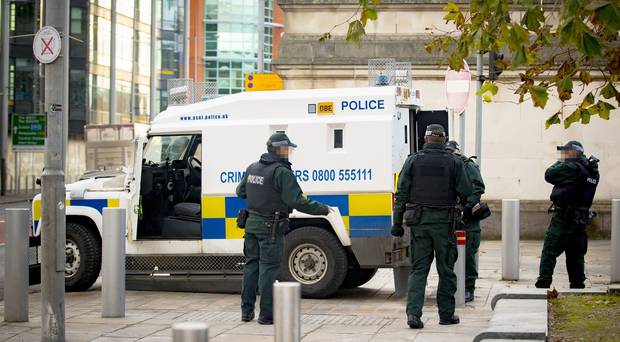
Report from the Court of Appeal where Madden & Finucane successfully represent Creggan man Steven Ramsey.
POLICE breached the rights of a Derry man repeatedly stopped and searched under anti-terrorism legislation, the Court of Appeal has ruled.
Senior judges identified failures in recording the basis for the actions taken against Steven Ramsey.
The former member of the 32 County Sovereignty Movement may now sue the Chief Constable for damages, his lawyer said.
Mr Ramsey (41) went to court claiming his right to privacy was breached by powers used to detain him without justification by any suspected dissident republican associations.
He has stated that he does not belong to any illegal organisation or political party and has no convictions for paramilitary activity.
His challenge centred on stop and search actions carried out under the Justice and Security (NI) Act 2007.
According to Mr Ramsey’s lawyers there were more than 150 incidents between 2009 and 2013.
Notes from some of the searches indicated that he was stopped due to “suspected dissident republican links” or “as a result of confidential briefings”.
But proceedings issued against the Chief Constable and Secretary of State only focused on seven incidents after a code of practice was introduced in 2013.
The applicant, from Derry’s Creggan area, argued that the power to detain him contravened Article 8 of the European Convention on Human Rights.
In 2018 the High Court found that PSNI failures to record the grounds for searches under scrutiny were inconsistent with a code of practice.
But a judge dismissed the challenge after deciding the evidence established there had been a basis for each incident.
Appealing that ruling, counsel for Mr Ramsey insisted the stop and search authority is not subject to adequate legal protections and amounted to harassment.
She submitted that it amounted to an arbitrary power used more than necessary.
The court heard that being categorised as a dissident republican, through not supporting the Good Friday Agreement, was not enough reason for the action taken against him.
Concerns must relate to any suspected munitions or wireless apparatus, it was contended.
Appeal judges concluded that the scheme as a whole contains sufficient safeguards to protect the individual against arbitrary interference.
Police are required, however, to identify the basis for exercising the power.
There was a breach of Article 8 in the searches carried out on Mr Ramsey due to the failure to record the basis for the action at the time or shortly afterwards, the court confirmed.
Following the ruling Mr Ramsey’s solicitor, Fearghal Shiels of Madden & Finucane, said the recording requirement was regarded as critical for monitoring and supervision of the powers.
“In Mr Ramsey’s case, the PSNI effectively ceased subjecting him to stop and search once he brought these proceedings in the High Court and officers were required to submit sworn evidence to the court,” Mr Shiels said.
“His position in bringing these proceedings has been totally vindicated by today’s decision, and he will now be advised in relation to an action for damages against the Chief Constable.”
You must be logged in to post a comment.